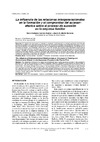Identificador persistente para citar o vincular este elemento:
https://accedacris.ulpgc.es/jspui/handle/10553/58043
| Título: | La influencia de las relaciones intergeneracionales en la formación y el compromiso del sucesor: efectos sobre el proceso de sucesión en la empresa familiar | Otros títulos: | The Influence of Intergenerational Relationships on Successor’s Training and Commitment: Effects on the Succesion Process in the Family Firm | Autores/as: | Cabrera Suárez, María Katiuska Martín Santana, Josefa Delia |
Clasificación UNESCO: | 5311 Organización y dirección de empresas | Palabras clave: | Empresas familiares Sucesiones |
Fecha de publicación: | 2010 | Publicación seriada: | Revista Europea de Direccion y Economia de la Empresa | Resumen: | El objetivo de este trabajo es diseñar y contrastar empíricamente un modelo explicativo del éxito del proceso de sucesión en la empresa familiar en función de una serie de variables frecuentemente asociadas a dicho éxito en la literatura. Los datos fueron obtenidos de 113 cuestionarios realizados a predecesores y sucesores en 93 empresas familiares. Los resultados indican que el éxito del proceso de sucesión está relacionado positivamente con el compromiso afectivo y normativo del sucesor, pero no con la implicación del predecesor en la formación del sucesor. También se concluye que la calidad de la relación entre predecesor y sucesor tiene una influencia positiva sobre el compromiso afectivo y sobre la implicación del predecesor en la formación del sucesor, pero no sobre el compromiso normativo. Finalmente, los resultados indican que existe una relación negativa entre las dimensiones normativa y afectiva del compromiso del sucesor. The objective of this work is to design and empirically test a model explaining success in the succession process in the family firm according to a series of variables frequently identified in the literature as being linked to that success. The data were obtained from 113 questionnaires completed by predecessors and successors in 93 family firms. The results indicate that success in the succession process is favorably influenced by both affective and normative commitment of the successor but not by the predecessor’s involvement in the training of the succes-sor. They also show that the quality of the relationship between predecessor and successor has a positive influence on affective commitment and the predecessor’s involvement in the successor’s training, but not on normative com-mitment. Finally, results show that there is a negative relation between the normative and affective dimensions of successor’s commitment. |
URI: | https://accedacris.ulpgc.es/handle/10553/58043 | ISSN: | 1019-6838 | Fuente: | Revista europea de dirección y economía de la empresa[ISSN 1019-6838],v. 19 (2), p. 111-128 | URL: | http://dialnet.unirioja.es/servlet/articulo?codigo=3185171 |
| Colección: | Artículos |
Citas SCOPUSTM
8
actualizado el 08-jun-2025
Visitas
186
actualizado el 15-ene-2026
Descargas
68
actualizado el 15-ene-2026
Google ScholarTM
Verifica
Comparte
Exporta metadatos
Los elementos en ULPGC accedaCRIS están protegidos por derechos de autor con todos los derechos reservados, a menos que se indique lo contrario.
